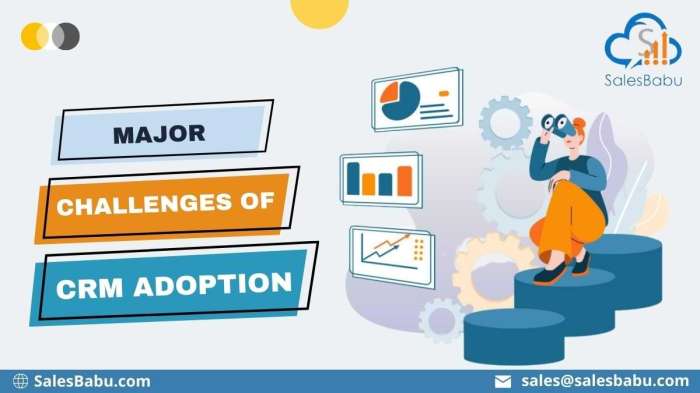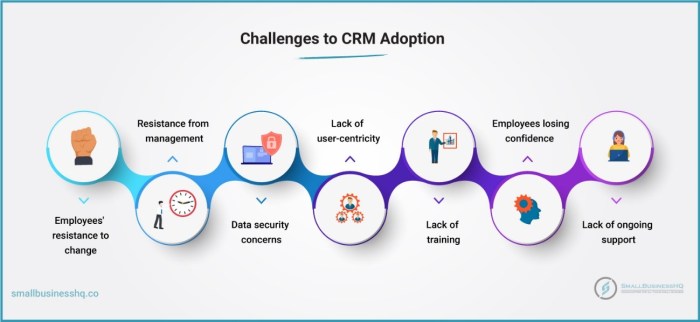Challenges in CRM adoption present a myriad of obstacles that businesses must navigate to successfully implement customer relationship management systems. From complexities in software to impacts on operations, these challenges shape the landscape of CRM adoption.
In this article, we delve into the common hurdles faced by organizations, explore the reasons behind the difficulties in CRM adoption, and provide strategies to overcome these challenges effectively.
Challenges in CRM Adoption

Implementing Customer Relationship Management (CRM) systems can be a daunting task for many businesses due to various challenges that arise during the adoption process. These challenges can hinder the successful integration and utilization of CRM software within an organization.
Common Challenges Faced by Businesses:
- Lack of Employee Buy-In: One of the key challenges in CRM adoption is the resistance from employees who may be reluctant to embrace new technology or change in processes.
- Data Quality Issues: Maintaining accurate and up-to-date customer data can be a challenge, leading to unreliable insights and reports generated by the CRM system.
- Integration Complexity: Integrating CRM software with existing systems and databases can be complex and time-consuming, especially in organizations with multiple legacy systems.
- Cost Considerations: The cost of implementing and maintaining a CRM system can be a barrier for many businesses, especially small and medium-sized enterprises.
Reasons Why CRM Adoption Can Be Difficult:
- Change Management: Implementing a CRM system often requires changes in workflows and processes, which can be met with resistance from employees who are comfortable with the status quo.
- Lack of Training and Support: Inadequate training and support for employees on how to use the CRM software effectively can hinder adoption and lead to underutilization of the system.
- Cultural Fit: The organizational culture may not align with the principles of CRM, making it challenging to implement and sustain the use of CRM systems.
Complexity of CRM Software:, Challenges in CRM adoption
The complexity of CRM software itself can present challenges during adoption. Features such as customization options, integration capabilities, and data analytics tools can overwhelm users and administrators, leading to slow adoption rates and underutilization of the system.
Obtain access to Common RMM challenges and solutions to private resources that are additional.
Impact on Business Operations

In the realm of CRM adoption, challenges can significantly impact overall business operations. From customer relationships to sales and marketing processes, the difficulties faced in implementing CRM systems can have far-reaching consequences.
Effect on Customer Relationships
Implementing a CRM system comes with the promise of improving customer relationships through better data management and personalized interactions. However, if the adoption process is riddled with challenges such as poor data migration, lack of user training, or system downtime, it can lead to a breakdown in communication with customers. For example, inaccurate data entry or missing customer information can result in lost opportunities for engagement, ultimately affecting customer satisfaction and loyalty.
Inefficiencies in Sales and Marketing Processes
CRM adoption challenges can also lead to inefficiencies in sales and marketing processes. For instance, if the CRM system is not integrated seamlessly with existing tools and software, it can create bottlenecks in accessing and sharing crucial customer data. This can hinder sales teams from effectively tracking leads, managing pipelines, and closing deals. Moreover, marketing efforts may suffer from a lack of accurate customer segmentation or personalized targeting, resulting in ineffective campaigns and wasted resources.
Strategies to Overcome CRM Adoption Challenges

Implementing a Customer Relationship Management (CRM) system can be a daunting task for many businesses, but there are effective strategies that can help overcome adoption hurdles and ensure successful implementation. By addressing common challenges head-on and being proactive in the approach, organizations can maximize the benefits of CRM software.
Training and Education
One of the most crucial strategies for overcoming CRM adoption challenges is to invest in comprehensive training and education for employees. Providing staff with the necessary knowledge and skills to utilize the CRM system effectively can significantly increase user adoption rates and ensure that the software is being used to its full potential.
Customization and Integration
Another key strategy is to customize the CRM software to align with the specific needs and processes of the organization. By tailoring the system to fit the unique requirements of the business, employees are more likely to embrace the technology and see its value in improving their day-to-day operations. Additionally, integrating the CRM system with other tools and platforms used by the organization can streamline processes and enhance overall efficiency.
Leadership Support and Involvement
Strong leadership support and involvement are essential for successful CRM adoption. Leaders should champion the implementation of the CRM system, communicate its benefits to employees, and actively participate in the process to demonstrate its importance. When leadership is actively engaged in the adoption process, employees are more likely to follow suit and fully commit to using the CRM software.
Continuous Monitoring and Feedback
Regularly monitoring the usage and effectiveness of the CRM system is vital for identifying any issues or areas for improvement. Gathering feedback from employees about their experience with the software can help pinpoint challenges and enable the organization to make necessary adjustments. By continuously assessing and refining the CRM strategy, businesses can ensure long-term success and maximize the return on investment.